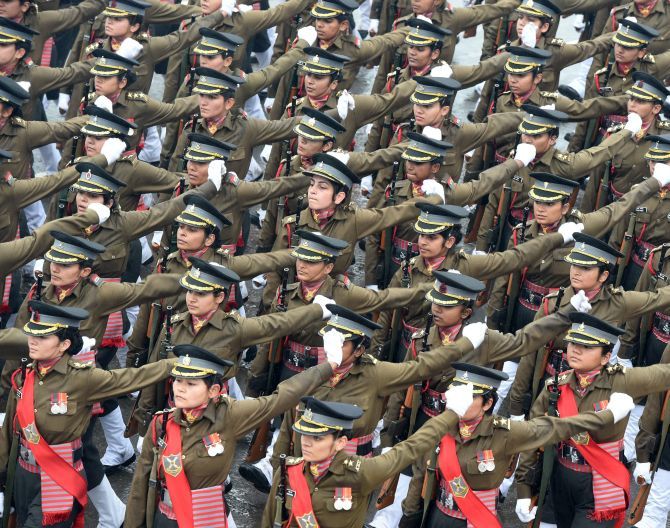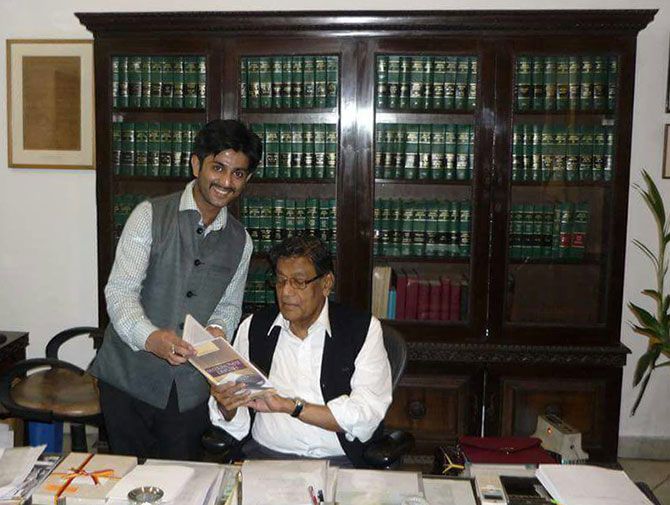'Women were not allowed in the Territorial Army before January 5, 2018.'
'Girls are not allowed to be admitted to Sainik Schools and Rashtriya Military schools.'
'Women are not allowed in army education corps, and in engineering services' (as permanent commission).
'Women can't be religious preachers in the army.'
'There is a need to change with time.'

IMAGE: Women soldiers march in the Republic Day parade. Photograph: PTI Photo
Advocate Kush Kalra filed a Public Interest Litigation against the Territorial Army's discriminatory rule that prevented women from joining the TA, an organisation of gainfully employed, physically able Indian citizens for voluntary military service.
As a result of the PIL, the court paved the way for women's entry to the Territorial Army after 70 years.
Kalra 30, has also filed a PIL against the discrimination faced by married women being inducted into JAG, the legal branch of the army.
So far, he has filed six PILs on gender discrimination against the army and navy, including the bar on admitting girls into Sainik Schools, discrimination faced by women in the army education corps and engineering services -- and also in some branches of the navy.
Kalra tells Rediff.com's Archana Masih why he takes up the causes he does and why the military needs to change with the times.
It was because of a PIL filed by you that the high court made way for the entry of women in the Territorial Army. Is it correct that you filed this PIL because you saw the Centre's recruitment ad that only called for male candidates?
The Territorial Army Act, 1948 provides for the recruitment of only males in the Territorial army.
I found this clause to be discriminatory against the Constitutional provisions and the court on January 5, 2018, after 70 years, paved the way for recruitment of women in the Territorial Army.
The judgment can be read here (external link.
Have you met women who wanted to join the Territorial Army, but couldn't because of this rule?
I have met many women who wish to join the Territorial Army, but could not pursue their dreams because of the discriminatory rule. Now I am happy that all the women who are eligible to apply as per rules can apply for the same.
What made you file another PIL (Public Interest Litigation) against the discrimination faced by married women being inducted into JAG (Judge Advocate General), the legal branch of the army?
In the 2014, when I carefully read the JAG advertisement, I found that it provides for recruitment of only unmarried females in contrast to married/unmarried males leaving the married women behind.
I found this practice to be discriminatory as per article 14, 16 and 19(1)(g) of the Constitution. After carefully analysing all the legal angles, through advocate Jyotika Kalra (currently, a member of the National Human Rights Commission who appeared pro bono) I filed this PIL.
Why do you think there is such a rule -- because the military seems quite open to women in military service? Is it because it is an old rule in the books that has not been changed or has been overlooked?
Presently girls are not allowed to be admitted to Sainik Schools and Rashtriya Military schools.
Women were not allowed in the Territorial Army before January 5, 2018.
Women are not allowed in army education corps, which is a permanent commission and does not recruit women as of now.
Women are also not allowed in engineering services (as permanent commission).
Women can't be religious preachers in the army.
There is a need to change with time.
Were you approached by women who had been denied entry into JAG to file the PIL or you did it on your own volition?
I proceeded with this PIL as I found in this case that prohibiting the entry of married women is a clear violation of fundamental rights available to women under the Constitution.
I filed the PIL in the JAG case on May 6, 2016.
In your petition, you call it 'institutionalised discrimination' against women. What is the existing practice in JAG? Are only unmarried women appointed? Are they asked to leave on getting married?
The recruitment policy of the Indian Army to recruit married/unmarried males and only unmarried females has been termed 'institutionalised discrimination'.
From 2016 they only recruited unmarried/married males and only unmarried females, but the new advertisement of JAG 2018 clearly mentions that they have put a bar of marriage for (both) men and women.
Currently only unmarried males/females can apply for JAG. Now they have put a bar of marriage on both males and females.
Also before 2018 in JAG, 10 seats were available for men and only 4 were for women.
In the new advertisement, women have been given 7 seats and men have been given 7 seats, and the petition is still pending before the honourable Delhi high court.
Any law graduate can apply for JAG.
What is the JAG policy in other countries?
There is no discrimination on the basis of marital status in other countries while doing recruitment for JAG officers.
The Delhi high court has asked the army to present a legal stand rather than file an affidavit in response -- what does this mean?
When the army was not able to justify its stand for non recruitment of married women, they put a bar of marital status in current JAG advertisement. This needs to be clarified by the army before the court.
What difference have PILs made in the country?
PILs have been of great importance in India. It can be satisfactorily seen from 1960 till date that many important rights of the citizens of India were enforced by the courts through PILs.
When you file a PIL, what is the cost incurred?
PIL means public interest litigation. It has to be done without any monetary benefit.

IMAGE: Kush Kalra presents a book written by him to Attorney General K K Venugopal, under whom he interned for a month in 2012.
Kalra has received the Youth Award from the ministry of youth affairs and has published 13 books on law. He has practiced as an advocate in the Delhi high court for 5 years.
What have been some of the reactions/feedback you have received (from women and men) after the judgment cleared the way for women's entry into the Territorial Army?
My friends told me that it was a landmark judgment in the sense that it had highlighted the gender discriminatory practises prevalent in society even in the 21st century.
The judgment just came last month. By when do you think we will see women joining the Territorial Army?
Even I am waiting for that day.
As a result of another PIL by you, stating that girls are not admitted to Sainik Schools and Rashtriya Military Schools, which are run by the defence ministry, the Delhi high court has asked the Centre for a response.
What makes you take up causes for girls/women, especially in the military?
Our Constitution prohibits gender discrimination and I as a citizen of India feel my duty to raise issues where gender discrimination is involved.
Set up by the first defence minister, Sainik Schools have been around for over 60 years. Why do you think such a discrimination was not noticed/taken into account or corrected by the government?
Girls are always neglected when it comes to joining the army.
The case is pending before the court.
How many PILs have you filed?
Six on the issues of gender discrimination in the army and navy.
What, according to you, are the pluses and minuses of the Indian legal system?
Delay in justice is a cause of worry for all of us.
We need to fill the judges' vacancies at all levels.
Who are the legal luminaries you admire?
I admire our current Attorney General Shri K K Venugopal the most.
During the days of my internship under him I have learnt that age is just numbers and hard work can lead to success in life.
What are the leading high points of the Constitution that are unique and provide safeguards to its citizens?
I am trying to write a commentary on Constitutional law.
My love for the Constitution is based on the fact how our Constitution makers have separated the legislature, executive and judiciary under the Constitution.
That is the reason the Indian Constitution is the best workable Constitution around the world.











 © 2025
© 2025